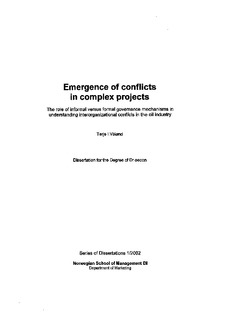Emergence of conflicts in complex project: The role of informal versus formal governance mechanisms in understanding interorganizational conflicts in the oil industry
Doctoral thesis
Permanent lenke
http://hdl.handle.net/11250/94306Utgivelsesdato
2002Metadata
Vis full innførselSamlinger
Sammendrag
This study is designed to explore conflict in buyer-seller relationships within complex projects. By focusing on conflict we can enhance our understanding of business relationships when these are put under pressure. The research problem is to find the basic reasons why conflict emerges within a technological and managerial complex environment.
The sources to conflict are expressed through two sets of governance mechanisms. Through the first, labeled informal governance mechanisms, the human factor and informal interaction are important ingredients. The second labeled formal governance mechanisms embraces procedures, contracts, and emphasize formal planning. This approach differs from contemporary studies of conflict in business relationships where the sources to conflict are mainly interpreted in terms of power differences between the parties.
The context is complex fabrication projects in the Norwegian oil industry supplied with one "non-project" from the same industry. The industrial network approach is applied as a theoretical frame of reference. This implies that the project is considered strongly interrelated with third parties and interdependent with activity and resource structures across company boundaries.
The study raises two basic questions that are approached through two different methodologies, a variable analysis and a qualitative approach. The questions are both related to the sources to conflict. Variable analysis is carried out in stage one of the study, and the qualitative study in stage two.
The first basic research question (stage one):
When informants from the buyer's and the seller's side assess events of conflict in complex projects, to what extent do they associate conflict with formal versus informal governance mechanisms? In order to answer specific events of conflict are extracted from real business relationships.
The second basic research question (stage two):
The second stage is a qualitative study for exploring threats related to the most important mechanisms revealed in the first part of the study. The findings in stage one are used as a starting point for a discussion with a new set of informants in order reveal why the most significant governance mechanisms cannot prevent the emergence of conflict.
Summing up, the study reveals that the "human factor" found in the informal governance mechanisms are of crucial importance when understanding why conflict occurs in complex projects. These findings are also supported by findings in the "non-project"-case. One major managerial implication of the findings is that the informal governance mechanisms, embracing the "human factor", should be carefully monitored and strengthened in relation to formal planning and routinization of complex activities.
Serie
Series of Dissertations01/2002
